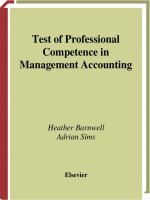Testbank of fundamental of management 7e by robin ch 04e
Bạn đang xem bản rút gọn của tài liệu. Xem và tải ngay bản đầy đủ của tài liệu tại đây (111.3 KB, 29 trang )
Fundamentals of Management, 7e (Robbins/DeCenzo/Coulter)
Entrepreneurship Module
1) Entrepreneurship is process of starting a new business to respond to an opportunity in the
market.
Answer: TRUE
Explanation: Entrepreneurship is an innovative attempt to take advantage of some need in the
market. Entrepreneurial organizations are always innovative and looking to grow.
Diff: 1
Page Ref: 111
2) An entrepreneurial venture is the same as a small business.
Answer: FALSE
Explanation: An entrepreneurial venture and a small business can look similar from the outside.
However an entrepreneurial venture focuses much more on being innovative, seeking
opportunities, and growth than a small business.
Diff: 2
Page Ref: 111
3) An entrepreneurial venture is much more likely to change an industry than a small business.
Answer: TRUE
Explanation: Being much more innovative than a small business, an entrepreneurial venture
looks to invent new products and methods of production that change an entire industry. An
example is the Viking Range, which helped create an entire new type of super-premium kitchen
appliance.
Diff: 2
Page Ref: 111
4) Most entrepreneurial ventures are successful.
Answer: FALSE
Explanation: Data shows that only 44 percent of ventures survive four years of business. After
seven years, only 31 percent of ventures remain.
Diff: 2
Page Ref: 112
5) One of the first things an entrepreneur does is look for potential opportunities in the
marketplace.
Answer: TRUE
Explanation: Identifying opportunity is the first thing any entrepreneur does. Without finding an
opportunity there is no reason to start an organization.
Diff: 2
Page Ref: 112
6) Legal issues for an entrepreneurial organization are typically addressed after the organization
is up and running.
Answer: FALSE
Explanation: Legal issues that involve taxes, liability, and such things as patents need to be
taken care of before the organization is up and running. How the organization is set up and
structured in a large part will determine how the legal issues are addressed.
Diff: 2
Page Ref: 112
1
Copyright © 2011 Pearson Education, Inc
7) Once the entrepreneurial organization is up and running, the entrepreneur becomes a manager.
Answer: TRUE
Explanation: After all planning and launching activities are over, the entrepreneur must assume
the role of manager and start helping to produce the goods or services she plans to provide.
Diff: 2
Page Ref: 112
8) An executive summary is the most complete kind of business plan.
Answer: FALSE
Explanation: An executive summary is the most brief form of a business plan, typically running
no longer than two pages in length.
Diff: 2
Page Ref: 112
9) A context analysis sizes up the target market and evaluates possible competitors to the
company.
Answer: FALSE
Explanation: An opportunity analysis sizes up the target market and evaluates possible
competitors to the company, not a context analysis. A context analysis gives a broad view of the
trends in the entire industry and its place in the economy.
Diff: 2
Page Ref: 113
10) An entrepreneurial venture's advertising strategy would be included in the description of the
business section of a full business plan.
Answer: TRUE
Explanation: The description of the business would include, among many other things, the
advertising strategy that the organization plans to employ when it is operational.
Diff: 2
Page Ref: 113
11) Since it is impossible to predict the future, projected income estimates are not part of a good
business plan.
Answer: FALSE
Explanation: Though often difficult to make, income forecasts are in fact an important part of a
business plan. Even if the estimates turn out to be wrong they still give planners a baseline to
which they can make comparisons.
Diff: 2
Page Ref: 114
12) The two primary factors that affect the legal structure of an entrepreneurial organization are
taxes and legal liability.
Answer: TRUE
Explanation: The way the organization is structured has a critical effect on how it will be taxed
and what liability it will have. Organizations with a lot of assets, and therefore a lot to lose, for
example, must be structured differently than those with little to lose.
Diff: 2
Page Ref: 114
13) If the legal structure of an entrepreneurial venture does not turn out to be ideal, it can always
be changed easily once the organization is up and running.
Answer: FALSE
Explanation: Changing the legal structure of the organization is difficult and time-consuming, so
it is best for the entrepreneur to choose the right structure at the outset.
Diff: 2
Page Ref: 114
2
Copyright © 2011 Pearson Education, Inc
14) When they first start out, most small entrepreneurial ventures have a very informal
organizational structure.
Answer: TRUE
Explanation: In many cases, there is no real structure other than the entrepreneur making all
decisions and delegating work only as he or she sees fit.
Diff: 2
Page Ref: 115
15) An entrepreneurial venture that sees its competitive advantage in cost efficiency would tend
to adopt an organic style organizational structure.
Answer: FALSE
Explanation: A venture that focused on costs and efficiency would tend to need a more
mechanistic, rather than an organic approach.
Diff: 2
Page Ref: 115
16) Since they are often overwhelmed by the pressure of decisions, one chore that most
entrepreneurs never hesitate to delegate is decision making.
Answer: FALSE
Explanation: In fact, most entrepreneurs have great difficulty letting go and allowing someone
else to make decisions. Letting others make decisions causes the entrepreneur to lose some
control over the organization so the aversion to sharing decision-making power is not unfounded.
Diff: 2
Page Ref: 115
17) When hiring, entrepreneurs are typically much less concerned with matching a candidate's
values to the organization's organizational culture than traditional HRM managers.
Answer: FALSE
Explanation: The opposite is true. Entrepreneurs are much more concerned about getting a good
match between a candidate and the organizational culture than traditional HRM managers.
Diff: 2
Page Ref: 115
18) The classic "entrepreneurial personality" is a person who is high in self-confidence,
motivation, and energy.
Answer: TRUE
Explanation: Other well-known traits of entrepreneurs include risk-taking, resourcefulness,
persistence, and autonomy.
Diff: 2
Page Ref: 116
19) People with proactive personalities tend to react to their environment more than trying to
change their environment.
Answer: FALSE
Explanation: The reverse is true. Proactive people tend to take action rather than waiting to react
to what happens to them.
Diff: 2
Page Ref: 116
20) You would expect an entrepreneur who has a grand vision for the future to be more of a risktaker than an entrepreneur who is using his or her venture simply as a source of income.
Answer: TRUE
Explanation: Entrepreneurs who are seeking ambitious growth tend to be risk takers.
Entrepreneurs who are simply looking to put money in their pockets tend to take fewer risks.
Diff: 2
Page Ref: 116
3
Copyright © 2011 Pearson Education, Inc
21) The more proactive you are, the more likely you are to be an entrepreneur.
Answer: TRUE
Explanation: People who rate high on proactivity tests are more likely to be entrepreneurs.
Proactivity is largely a measure of how strongly a person feels about taking action to solve
problems.
Diff: 2
Page Ref: 117
22) Identifying opportunity is not a trait of a person with a proactive personality.
Answer: FALSE
Explanation: In proactivity tests such as the one on page 117, the ability to identify opportunity
is listed as a characteristic of a proactive person.
Diff: 2
Page Ref: 117
23) Employee empowerment increases productivity but decreases employee motivation.
Answer: FALSE
Explanation: Empowerment increases both productivity and motivation. In fact, productivity
typically rises because motivation has risen.
Diff: 2
Page Ref: 118
24) A good way to ease into employee empowerment is to let employees share in decision
making.
Answer: TRUE
Explanation: Participative decision making allows both bosses and employees to get used to the
idea of employees making decisions. After trust has been established, the employees can then be
empowered to make decisions on their own.
Diff: 2
Page Ref: 118
25) Employee empowerment has little effect on an organization's profits or productivity.
Answer: FALSE
Explanation: Empowerment, when properly done, has been shown to result in gains in
productivity, profits, quality, and employee satisfaction.
Diff: 2
Page Ref: 118
26) The leader of an entrepreneurial organization is like a jazz band leader because she controls
every note that her "musicians" play.
Answer: FALSE
Explanation: A jazz leader does not control individual notes of musicians. An entrepreneurial
leader, in the same way, should not try to control the individual actions of her employees.
Instead, she should let employees work on their own, seeking only to get the best out of them for
the good of the group.
Diff: 2
Page Ref: 118
27) Nonvisionary entrepreneurial leaders usually outperform visionary entrepreneurial leaders.
Answer: FALSE
Explanation: The opposite is true. A study shows that visionary companies outperformed
nonvisionary companies by a wide margin in both standard financial measurements and stock
market performance.
Diff: 2
Page Ref: 119
4
Copyright © 2011 Pearson Education, Inc
28) A command-and-control leadership style works best with an entrepreneurial organization that
is organized in teams.
Answer: FALSE
Explanation: Teams respond much better to a coach-and-collaboration leadership style than a
command-and-control leadership style.
Diff: 2
Page Ref: 119
29) One of the keys that distinguishes an entrepreneurial organization from a conventional
organization is the concerted emphasis on growth.
Answer: TRUE
Explanation: Focus on growth is a distinguishing characteristic for an entrepreneurial venture. If
an organization doesn't vigorously pursue growth, it isn't truly entrepreneurial.
Diff: 2
Page Ref: 119
30) The first step in managing a downturn in an entrepreneurial business is to recognize that
things are not going well.
Answer: TRUE
Explanation: Many entrepreneurs will willfully ignore signs of trouble, preferring to redouble
their efforts in a positive direction rather than try to remedy problems that are occurring. So the
most important step in managing a downturn is recognizing the downturn in the first place.
Diff: 2
Page Ref: 119
31) Selling an entrepreneurial venture is always a sign of failure.
Answer: FALSE
Explanation: Exiting a venture and harvesting the profits of the sale can be very lucrative, and
not at all a sign of failure.
Diff: 2
Page Ref: 120
32) Because entrepreneurship is so time-consuming and energy-consuming, many entrepreneurs
have trouble in their personal lives.
Answer: TRUE
Explanation: Running an entrepreneurial venture is often a never-ending enterprise, leaving
entrepreneurs with little or no time for family or friends. For this reason, entrepreneurs need to
become expert time managers, always being able to find the time for true priorities.
Diff: 2
Page Ref: 120
33) Saving money by avoiding the expense of professional legal and accounting advice is often a
mistake for entrepreneurs.
Answer: TRUE
Explanation: Entrepreneurs should avoid being penny-wise and pound foolish. When they need
help, they should spend the money for professional service. Good professional advice is often
critical to the survival of an entrepreneurial venture.
Diff: 2
Page Ref: 120
5
Copyright © 2011 Pearson Education, Inc
34) It is a good idea for an entrepreneur to develop a network of trusted friends and advisors to
help with problems and decisions.
Answer: TRUE
Explanation: What many entrepreneurs find especially helpful are peers who can say "no" to
them. Inside the organization an entrepreneur often has no one with the power to second-guess
his or her judgment. A disinterested peer can be critical without risking his or her job.
Diff: 2
Page Ref: 120
35) An entrepreneurial venture and a small business ________.
A) are superficially similar
B) are identical
C) have nothing in common
D) are impossible to tell apart
Answer: A
Explanation: A) Entrepreneurial ventures and small businesses are clearly not identical, ruling
out "identical and impossible to tell apart" as correct responses, but they do have a number of
characteristics in common, ruling out "having nothing in common" as a correct response. The
two are similar on the surface in that they are both small in size (at least initially) and often
informally run, making "being superficially similar" the correct response for this question. An
entrepreneurial venture focuses much more on being innovative, seeking opportunities, and
growth than a small business.
Diff: 2
Page Ref: 111
36) One key difference between an entrepreneurial venture and a small business is that the
entrepreneurial venture focuses on ________.
A) productivity
B) efficiency
C) quality
D) innovation
Answer: D
Explanation: D) Where small businesses typically concentrate on such things as productivity,
efficiency, and quality to find their niche in a market, entrepreneurial ventures look to focus on
innovation, creating new products or services that don't exist in a market, and in some cases
creating a new market. This makes innovation the correct response for this question.
Diff: 2
Page Ref: 111
6
Copyright © 2011 Pearson Education, Inc
37) When it was first starting out, the Viking Range company qualified as an entrepreneurial
organization because its products were ________.
A) high in quality
B) expensive
C) innovative and different
D) loved by serious cooks
Answer: C
Explanation: C) The thing that distinguishes an entrepreneurial venture from other ventures is
that the entrepreneurial venture is innovative in some way. Producing products that were costly,
high in quality, or beloved did not make Viking an entrepreneurial company. Making innovative
products did qualify Viking as entrepreneurial, so innovative is the correct response for this
question.
Diff: 2
Page Ref: 111
38) Besides being innovative in some way, a second defining characteristic of an entrepreneurial
venture is that it is ________.
A) small in size
B) focused on growth
C) dedicated to quality
D) original and creative
Answer: B
Explanation: B) Size and quality have nothing to do with defining an entrepreneurial company.
Being original and creative is another way of saying that a company is innovative, so original is
an incorrect response. Focus on growth is a defining characteristic of an entrepreneurial venture,
so focused on growth is the correct response for this question.
Diff: 2
Page Ref: 111
39) An "accidental entrepreneur" is someone who became an entrepreneur because she
________.
A) always had a dream to start a company
B) lost her job
C) identified a great opportunity
D) quit her job
Answer: B
Explanation: B) Though accidental entrepreneurs may have always had a dream to start a
company and may be good at identifying opportunities, those are not primary reasons why they
became entrepreneurs. Instead, they became entrepreneurs because they had lost, rather than quit
their jobs, typically in a corporation. This makes losing one's job the correct response for this
question.
Diff: 2
Page Ref: 111
7
Copyright © 2011 Pearson Education, Inc
40) In the wake of the recent economic downturn, statistics show that entrepreneurship is
________.
A) dramatically rising
B) modestly rising
C) falling
D) neither rising nor falling
Answer: B
Explanation: B) The lack of jobs in today's economy is probably the cause of the recent increase
in entrepreneurship, but this increase is modest rather than dramatic, making modestly rising the
correct response and ruling out dramatically rising. Note that this modest increase also rules out
the other two choices as correct responses because both include "falling" in their answer.
Diff: 2
Page Ref: 111
41) After four years, ________ business.
A) 56 percent of entrepreneurial ventures are out of
B) 56 percent of entrepreneurial ventures are still in
C) 31 percent of entrepreneurial ventures are out of
D) two-thirds of entrepreneurial ventures are out of
Answer: A
Explanation: A) After four years, only 44 percent of entrepreneurial ventures remain in business,
making "56 percent are out" the correct response for this question and ruling out "56 percent are
still in." After two years, two-thirds of the ventures are still in business, not out of business. After
seven years, 31 percent of the ventures are still in business, not out of business.
Diff: 2
Page Ref: 111
42) Survival rates of entrepreneurial ventures that started in a recession are ________ those that
started in an expansion.
A) somewhat greater than
B) less than
C) the same as
D) much greater than
Answer: C
Explanation: C) Surprisingly, it makes no difference when entrepreneurial ventures start. Their
survival rates are the same whether they originated during a recession or an expansion, making
the same the correct response for this question and ruling out all other choices.
Diff: 2
Page Ref: 112
8
Copyright © 2011 Pearson Education, Inc
43) In most cases, the first step in the initial pre-planning phase of the entrepreneurial process is
this.
A) pinpointing potential competitive advantages
B) identifying potential opportunities
C) exploring finance options
D) researching the venture's feasibility
Answer: B
Explanation: B) Without a promising opportunity there is no reason to embark on a venture in
the first place. So the first step in the pre-planning phase of the entrepreneurial process is to
identify a promising potential opportunity in the marketplace, making identifying opportunities
the correct response for this question. The second step is to pinpoint competitive advantages that
your approach to developing the opportunity might offer. If you seem to have a real competitive
edge, the third step is to see how feasible the venture is by estimating costs and assessing
competitors. The final step of the process, if other things check out, is to explore options for
funding.
Diff: 2
Page Ref: 112
44) This is typically the second step in the initial pre-planning phase of the entrepreneurial
process.
A) researching the venture's feasibility
B) identifying potential opportunities
C) exploring finance options
D) pinpointing potential competitive advantages
Answer: D
Explanation: D) After a promising potential opportunity in the marketplace has been identified
as step one of the process, the second step is to pinpoint competitive advantages that you might
have in developing this opportunity, making pinpointing advantages the correct response for this
question. If you seem to have a genuine competitive edge, the third step is to see how feasible the
venture is by estimating costs and assessing competitors. The final step of the process, if other
things check out, is to explore options for funding.
Diff: 2
Page Ref: 112
45) The third step in the initial pre-planning phase of the entrepreneurial process is ________.
A) exploring finance options
B) pinpointing potential competitive advantages
C) researching the venture's feasibility
D) identifying potential opportunities
Answer: C
Explanation: C) After identifying both a promising potential opportunity in the marketplace and
competitive advantages you might have in developing this opportunity, the third step in the preplanning phase of the entrepreneurial process involves gauging the feasibility of the project. This
may involve estimating costs, assessing competitors, and generally evaluating whether or not the
idea is actually realistic, making researching feasibility the correct response for this question.
The final step of the process, if other things check out, is to explore options for funding.
Diff: 2
Page Ref: 112
9
Copyright © 2011 Pearson Education, Inc
46) The fourth step in the initial pre-planning phase of the entrepreneurial process is ________.
A) exploring finance options
B) researching the venture's feasibility
C) pinpointing potential competitive advantages
D) identifying potential opportunities
Answer: A
Explanation: A) After identifying both a promising opportunity in the marketplace and
competitive advantages you might have in developing this opportunity, the third step in of the
process involves gauging the feasibility of the project. Once all of these other steps have passed
muster, the final step of the process is to see whether your ideas are fundable. This may involve
having discussions with banks and other sources of capital and explaining your plans and
qualifications to them.
Diff: 2
Page Ref: 112
47) During the first step of the planning and organizing phase of an entrepreneurial venture, this
is accomplished.
A) selecting a legal business organization form
B) stating a mission
C) selecting an organizational design
D) creating a business plan
Answer: B
Explanation: B) Once the pre-planning phase of developing an entrepreneurial venture is
complete, the planning and organizing phase of the project begins. The first step of this process
involves identifying a mission for the organization, making stating a mission the correct response
for this question. The second step involves creating a business plan for the organization. The
third step requires the entrepreneur to select an official legal form for the organization to manage
tax and liability issues. The final step in the process involves creating an organizational design
for the venture that outlines how work will be carried out.
Diff: 2
Page Ref: 112
48) During the second step of the planning and organizing phase of an entrepreneurial venture,
an entrepreneur ________.
A) states a mission
B) selects a legal business organization form
C) creates a business plan
D) selects an organizational design
Answer: C
Explanation: C) The first step of the planning and organizing phase of the entrepreneurial
process involves identifying a mission for the organization. The second step involves creating a
carefully thought out business plan that details how the organization will operate and who will be
involved in its operation, making creating a business plan the correct response for this question.
The third step requires the entrepreneur to select an official legal form for the organization to
manage tax and liability issues. The final step in the process involves creating an organizational
design for the venture that outlines how work will be carried out.
Diff: 2
Page Ref: 112
10
Copyright © 2011 Pearson Education, Inc
49) During the third step of the planning and organizing phase of an entrepreneurial venture, an
entrepreneur ________.
A) selects an organizational design
B) creates a business plan
C) states a mission
D) selects a legal business organization form
Answer: D
Explanation: D) The first step of the planning and organizing phase of the entrepreneurial
process involves identifying a mission for the organization. The second step involves creating a
carefully thought out business plan that details how the organization will operate and who will be
involved in its operation. The third step requires the entrepreneur to select an official legal form
for the organization to manage tax and liability issues, making selecting a legal form the correct
response for this question. The final step in the process involves creating an organizational
design for the venture that outlines how work will be carried out.
Diff: 2
Page Ref: 112
50) During the fourth and final step of the planning and organizing phase of an entrepreneurial
venture, this is accomplished.
A) selecting a legal business organization form
B) stating a mission
C) selecting an organizational design
D) creating a business plan
Answer: C
Explanation: C) The first step of the planning and organizing phase of the entrepreneurial
process involves identifying a mission for the organization. The second step involves creating a
carefully thought out business plan that details how the organization will operate and who will be
involved in its operation. The third step requires the entrepreneur to select an official legal form
for the organization to manage tax and liability issues, The final step in the process involves
creating an organizational design for the venture that outlines how work will be carried out,
making selecting a design the correct response for this question.
Diff: 2
Page Ref: 112
51) Once an entrepreneurial venture is actually up and running, the entrepreneur switches to a
________ role.
A) managerial
B) ceremonial figure-head
C) background
D) subordinating
Answer: A
Explanation: A) The initial goal of the entrepreneur is to get the organization functioning. Once
that is accomplished, the entrepreneur switches to a managerial role in which she functions as
CEO, leader, and spokesperson for the organization, making managerial the correct response for
this question and ruling out all other responses.
Diff: 2
Page Ref: 112
11
Copyright © 2011 Pearson Education, Inc
52) This is the simplest and most brief type of business plan.
A) synopsis-type plan
B) full business plan
C) summary business plan
D) executive summary
Answer: D
Explanation: D) An executive summary is a condensed business plan that is no more than two
pages in length that briefly describes how the organization will operate, making executive
summary the correct response for this question. A synopsis-type plan is a step up from an
executive summary, providing an executive summary and a separate proposal that describes the
attractive characteristics of the venture to investors. A summary business plan includes an
executive summary and a brief description of all key components of the venture. A full business
plan includes an executive summary and detailed analyses of all of the venture's major
components.
Diff: 2
Page Ref: 112-113
53) This type of business plan is a step up from the simplest type of business plan.
A) summary business plan
B) executive summary
C) synopsis-type plan
D) full business plan
Answer: C
Explanation: C) An executive summary is the simplest type of business plan that briefly
describes how the organization will operate. A synopsis-type plan is a step up from an executive
summary, providing an executive summary and a separate proposal that describes the attractive
characteristics of the venture to investors, making a synopsis-type plan the correct response for
this question. A summary business plan provides more than a synopsis-type plan and includes an
executive summary and a brief description of all key components of the venture. A full business
plan is the most complete plan and includes an executive summary and detailed analyses of all of
the venture's major components.
Diff: 2
Page Ref: 112-113
54) This type of business plan is a step down from the most complete type of business plan.
A) summary business plan
B) full business plan
C) executive summary
D) synopsis-type plan
Answer: A
Explanation: A) An executive summary is the simplest type of business plan that briefly
describes how the organization will operate. A synopsis-type plan is a step up from an executive
summary, providing an executive summary and a separate proposal that describes the attractive
characteristics of the venture to investors. A summary business plan provides more than a
synopsis-type plan and includes an executive summary and a brief description of all key
components of the venture. A summary plan is one step down from a full business plan, the most
complete plan. This makes a summary business plan the correct response for this question.
Diff: 2
Page Ref: 112-113
12
Copyright © 2011 Pearson Education, Inc
55) This is the the most complete and comprehensive type of business plan.
A) executive summary
B) full business plan
C) summary business plan
D) synopsis-type plan
Answer: B
Explanation: B) A full business plan is the most complete and comprehensive business plan and
includes an executive summary and detailed analyses of all of the venture's major components,
making full business plan the correct response for this question. An executive summary is the
simplest type of business plan that briefly describes how the organization will operate. A
synopsis-type plan is a step up from an executive summary, providing an executive summary and
a separate proposal that describes the attractive characteristics of the venture to investors. A
summary business plan provides more than a synopsis-type plan and includes an executive
summary and a brief description of all key components of the venture.
Diff: 2
Page Ref: 112-113
56) The mission statement of an entrepreneurial venture would be included in this section of a
full business plan.
A) analysis of opportunity
B) description of the business
C) executive summary
D) analysis of the context
Answer: C
Explanation: C) The executive summary, the first part of a full business plan, includes such
things as a mission statement and goals and functions like a brief summary of the entire business
plan, making executive summary the correct response for this question. The opportunity analysis
sizes up the market for the venture and assesses the organization's potential competitors. The
context analysis gives a broad description of the venture's industry and its place in the general
economy. The business description details how the venture will be organized, launched, and
managed.
Diff: 2
Page Ref: 113-114
57) This section of a full business plan would include possible income statements for the next
three years.
A) financial data and projections
B) executive summary
C) analysis of opportunity
D) description of the business
Answer: A
Explanation: A) The financial data and projections section provides estimates of costs, revenue,
and cash for the years to come, making financial data the correct response for this question. The
business description details how the venture will be organized, launched, and managed. The
executive summary, the first part of a full business plan, includes such things as a mission
statement and functions like a brief summary of the entire business plan. The opportunity
analysis sizes up the market for the venture and assesses the organization's potential competitors.
Diff: 2
Page Ref: 113-114
13
Copyright © 2011 Pearson Education, Inc
58) Identification of the organization's key personnel would be included in this section of a full
business plan.
A) analysis of the context
B) analysis of opportunity
C) description of the business
D) executive summary
Answer: C
Explanation: C) The business description details how the venture will be organized, launched,
and managed. It would include such details as identification of key personnel, making
description of the business the correct response for this question. The executive summary, the
first part of a full business plan, includes such things as a mission statement and functions like a
brief summary of the entire business plan. The opportunity analysis sizes up the market for the
venture and assesses the organization's potential competitors. The context analysis gives a broad
description of the venture's industry and its place in the general economy.
Diff: 2
Page Ref: 113-114
59) This section of a full business plan would include a description of the demographics of the
target market for the organization.
A) description of the business
B) financial data and projections
C) executive summary
D) analysis of opportunity
Answer: D
Explanation: D) The opportunity analysis sizes up the market for the venture and assesses the
organization's potential competitors. It also describes the target market for the organization in
detail, making opportunity analysis the correct response for this question. The financial data and
projections section provides estimates of costs, revenue, and cash for the years to come. The
business description details how the venture will be organized, launched, and managed. The
executive summary, the first part of a full business plan, includes such things as a mission
statement and functions like a brief summary of the entire business plan.
Diff: 2
Page Ref: 113-114
60) This section of a full business plan would include an assessment of the industry of the
venture and how it fits into the overall economic climate.
A) analysis of context
B) description of the business
C) financial data and projections
D) analysis of opportunity
Answer: A
Explanation: A) The context analysis gives a broad description of the entire business context of
the venture—how the venture is situated within its industry and how that industry fits into the
larger general economy. This makes analysis of context the correct response for this question.
The financial data and projections section provides estimates of costs, revenue, and cash for the
years to come. The business description details how the venture will be organized, launched, and
managed. The opportunity analysis sizes up the market for the venture and assesses the
organization's potential competitors.
Diff: 2
Page Ref: 113-114
14
Copyright © 2011 Pearson Education, Inc
61) The form of legal ownership that an entrepreneur chooses for a venture primarily affects
these concerns.
A) profit and productivity
B) taxes and liability
C) liability and planning
D) taxes and revenue
Answer: B
Explanation: B) The form of legal ownership determines liability issues—who will be held
responsible in the event that the organization gets involved in lawsuits or other legal issues—and
tax issues—how the organization will be considered by the IRS. This makes taxes and liability
the correct response and eliminates all other responses.
Diff: 2
Page Ref: 114
62) Entrepreneurs should take great care when choosing a form of legal ownership because once
one form is chosen it is ________ to change it to another form.
A) impossible
B) very difficult
C) easy
D) rather embarrassing
Answer: B
Explanation: B) The reason entrepreneurs want to get their legal ownership form right the first
time is not because it is embarrassing or impossible to change to another form but that it is
difficult and can be costly, making very difficult the correct response for this question. Note that
easy is wrong because being easy to change forms would not be a barrier to making a change.
Diff: 2
Page Ref: 114
63) Which of the following is NOT a way to organize an entrepreneurial venture?
A) partnership
B) corporation
C) cooperative association
D) sole proprietorship
Answer: C
Explanation: C) Partnerships, corporations, and sole proprietorships are all recognized legal
forms for an entrepreneurial venture. A cooperative association may be an informal term for a
venture, but it is not a recognized legal term so this choice is the correct response for this
question.
Diff: 2
Page Ref: 114
15
Copyright © 2011 Pearson Education, Inc
64) Many small entrepreneurial firms don't have a deliberately planned organizational structure
because ________.
A) they are inefficient
B) small firms never need structure
C) the IRS prevents them from having a structure
D) one person does "everything"
Answer: D
Explanation: D) In most cases, small firms are not inefficient and they do require some kind of
structure, though it may be a highly informal structure. The reason small firms tend not to have a
deliberate structure is that one person (or a few people) tend to take care of all issues for the
organization—making such structural categories as departmentalization unnecessary. This makes
one person doing "everything" the correct response for this question. Note that the IRS
preventing them from having a structure is ruled out because the IRS has little or no influence on
organizational structure.
Diff: 2
Page Ref: 115
65) In general, an entrepreneurial venture that sees ________ as its competitive advantage would
tend to be ________ in structure.
A) efficiency; organic
B) efficiency; mechanistic
C) innovation; mechanistic
D) innovation: formal
Answer: B
Explanation: B) The more efficiency-oriented an organization is, the less organic and the more
formal and mechanistic it is likely to be, making "efficiency; mechanistic" the correct response
for this question. An innovative organization would tend to be organic, not mechanistic, and
informal, not formal.
Diff: 2
Page Ref: 115
66) In general, an entrepreneurial venture that sees ________ as its competitive advantage would
tend to be ________ in structure.
A) efficiency; organic
B) efficiency; informal
C) innovation; mechanistic
D) innovation: informal
Answer: D
Explanation: D) The more innovation-oriented an organization is, the less mechanistic and the
more informal and organic it is likely to be, making "innovation; informal" the correct response
for this question. An efficiency-oriented organization would tend to be mechanistic, not organic,
and formal, not informal.
Diff: 2
Page Ref: 115
16
Copyright © 2011 Pearson Education, Inc
67) An entrepreneurial venture that manufactured low-cost generic pills would be likely to be
________.
A) very organic in structure
B) very innovative
C) fairly mechanistic in structure
D) very informal in structure
Answer: C
Explanation: C) The venture described sees opportunity in efficiency and cost-control, not
innovation. This emphasis on costs would tend to make the organization more mechanistic than
organic or informal, making fairly mechanistic the correct response for this question.
Organizations that rely on innovation tend to be organic while those that make standardized
products and rely on efficiency tend to be more mechanistic.
Diff: 2
Page Ref: 115
68) An entrepreneurial venture whose goal is to create humorous video games would be likely to
be ________.
A) very organic in structure
B) highly centralized
C) fairly mechanistic in structure
D) very mechanist in structure
Answer: A
Explanation: A) Organizations that rely on innovation tend to be organic while those that make
standardized products and rely on efficiency tend to be more mechanistic. This organization
clearly strives to be creative and innovative, so it would tend to have an organic structure, which
would rule out being centralized or mechanistic. The correct response for this question is
therefore very organic in structure.
Diff: 2
Page Ref: 115
69) When hiring, entrepreneurs are more likely to make sure that these two elements are a good
match than traditional HRM managers.
A) job skills and organizational needs
B) job qualifications and organizational requirements
C) formal job training and organizational requirements
D) values and organizational culture
Answer: D
Explanation: D) Though a good match between job skills, job qualifications, or job training and
organizational needs are certainly all important to an entrepreneurial organization, they are no
more important to an entrepreneur when hiring than a traditional HRM manager. What
entrepreneurs typically do find more important is a match between the organization's culture and
the attitudes and values of the person being hired, making values and organizational culture the
correct response for this question.
Diff: 2
Page Ref: 115
17
Copyright © 2011 Pearson Education, Inc
70) At an entrepreneurial organization, job candidates are more likely to hear about ________
than they will at conventional organizations.
A) benefits
B) monetary compensation
C) advancement through the ranks
D) learning opportunities
Answer: D
Explanation: D) Conventional organizations are likely to mention conventional job features at a
job interview, such as benefits, advancement, and compensation. In an entrepreneurial
organization one is much more likely to hear about the intangible, psychological benefits of
working for the firm that include such things as learning opportunities, making learning
opportunities the correct response for this question.
Diff: 2
Page Ref: 116
AACSB: Analytic Skills
71) Which of the following is the best one-word definition of a successful entrepreneur?
A) aggressive
B) stubborn
C) ambitious
D) unpredictable
Answer: C
Explanation: C) Though many entrepreneurs can be aggressive in the way they attack a problem,
stubborn in the way they persist in the face of difficulty, and unpredictable in the way they
recognize value and opportunity where no one else sees it, none of these terms encompasses the
essence of an entrepreneur like the word ambitious, making ambitious the correct response. The
ambition that entrepreneurs have is usually what drives them to be bold and aggressive in the
way they approach the world, so that is why this is the best choice here.
Diff: 2
Page Ref: 116
72) Which of the following terms does not fit the classic profile of the successful entrepreneur?
A) high energy
B) reflective
C) persistent
D) resourceful
Answer: B
Explanation: B) Successful entrepreneurs tend to be high energy individuals who tenaciously
persist in finding the solution to a difficult problem and are skilled in finding ways to get things
done when they seem impossible. One trait that entrepreneurs do not tend to have in abundance
is a reflective, contemplative nature—they tend to be do-ers not individuals who dither and mull
things over. This makes reflective the correct response for this question.
Diff: 2
Page Ref: 116
18
Copyright © 2011 Pearson Education, Inc
73) In general, entrepreneurs tend to ________ more than the average person.
A) cut corners
B) take risks
C) avoid risks
D) avoid cutting corners
Answer: B
Explanation: B) Cutting corners or avoiding the cutting of corners in most cases has little to do
with how entrepreneurial a person is. If anything, entrepreneurs are probably less likely to cut
corners than others, because they realize that cutting corners could in some instances jeopardize
their ambitions. What does correlate with the entrepreneurial personality is risk-taking.
Entrepreneurs tend to be risk takers, making taking risks the correct response and ruling out
avoiding risks as a correct response.
Diff: 2
Page Ref: 116
74) A person with a proactive personality is someone who ________.
A) takes action
B) avoids taking action
C) is entrepreneurial
D) is not entrepreneurial
Answer: A
Explanation: A) A proactive person is someone who tends to take action to influence his
environment, making taking action the correct response and ruling out avoiding taking action.
Though entrepreneurs tend to be proactive people, a proactive person is not necessarily
entrepreneurial, so both of the remaining choices can be ruled out.
Diff: 2
Page Ref: 116
75) People who become entrepreneurs often have ________.
A) family money
B) no family money
C) family members who are entrepreneurs
D) no family members who are entrepreneurs
Answer: C
Explanation: C) Though a source of money can be helpful to an entrepreneur, family money is
not recognized as an indicator for entrepreneurship, so both choices regarding family money can
be eliminated as correct responses. Entrepreneurs often do come from families that have other
entrepreneurs in them, especially parents, making "family members who are entrepreneurs" the
correct response for this question and ruling out "no family members who are entrepreneurs."
Diff: 2
Page Ref: 116
19
Copyright © 2011 Pearson Education, Inc
76) Perhaps the best predictor of whether or not a person will become an entrepreneur is how
________ she is.
A) proactive
B) talented
C) likeable
D) desperate
Answer: A
Explanation: A) Though recent job losses have caused many somewhat desperate individuals to
become entrepreneurs, that cause is still overshadowed in importance by how proactive a person
is, making proactive the correct response for this question. Being likeable and talented also can
be helpful to entrepreneurs, but those traits are not as important as how proactive a person is.
Diff: 2
Page Ref: 116
77) The key to the proactive personality is that a proactive person feels that he or she can
________ any environment.
A) adapt to
B) change
C) be successful in
D) be well liked in
Answer: B
Explanation: B) The defining characteristic of a proactive person is not how successful or wellliked he or she is. What defines proactivity is not being satisfied with the status quo. Rather than
adapt to unsatisfactory conditions, proactive people instead will try to initiate some kind of
change to make the environment suit their needs. All of these factors combined indicate that
change is the correct response for this question. A proactive person is a person who will not
hesitate to change his or her environment.
Diff: 3
Page Ref: 116
AACSB: Analytic Skills
78) A proactive person would be most likely to say this about his or her life.
A) I feel trapped.
B) If I don't like something, I fix it.
C) If I don't like something, I learn to live with it.
D) I like to leave well enough alone.
Answer: B
Explanation: B) Proactive people rarely feel trapped for long or learn to live within conditions
they don't like. Instead of leaving well enough alone, proactive people do the opposite; they
upset the apple cart and change things if the situation isn't to their liking. This means that
wanting to fix things best describes a proactive person, making fixing things one doesn't like the
correct response for this question.
Diff: 3
Page Ref: 117
AACSB: Analytic Skills
20
Copyright © 2011 Pearson Education, Inc
79) A proactive person is best described as someone who has skill in identifying ________.
A) a problem
B) trouble
C) a good idea
D) a good opportunity
Answer: D
Explanation: D) Though a proactive person would not be bad at recognizing problems, trouble,
or good ideas, a truly defining characteristic of a proactive person is the ability to recognize a
good opportunity, making good opportunity the correct response for this question. Recognizing
opportunities is what typically compels proactive people to act, and action is their most defining
characteristic.
Diff: 2
Page Ref: 117
80) This is the simplest and easiest way to find out how entrepreneurial you are.
A) The only way to find out is to initiate an entrepreneurial venture.
B) There is no way to find out.
C) You can take a test to see how proactive you are.
D) You can take a general intelligence test.
Answer: C
Explanation: C) Though initiating an entrepreneurial venture could determine how
entrepreneurial you are, it is clearly not a simple or easy way to answer the question, so initiating
a venture is an incorrect response. A much simpler measure of entrepreneurial proclivity is to
take a proactivity test like the one on page 117, making taking a test the correct response and
ruling out the other two choices. Since proactivity correlates strongly with the inclination to be
entrepreneurial, a high score on a proactivity test indicates a high likelihood of being
entrepreneurial.
Diff: 2
Page Ref: 117
81) In general, employee empowerment ________ motivation in employees.
A) increases
B) slightly decreases
C) strongly decreases
D) has no effect on
Answer: A
Explanation: A) Empowerment gives employees a greater sense of "ownership" in what they do,
so it tends to increase such things as motivation, effort, and job satisfaction. This makes
increases the correct response for this question and eliminates all other choices.
Diff: 2
Page Ref: 118
21
Copyright © 2011 Pearson Education, Inc
82) The typical reason for why an entrepreneur considers implementing employee empowerment
in an organization is to make sure that the organization ________.
A) stays nimble and flexible
B) is profitable
C) stays small and informal
D) is efficient
Answer: A
Explanation: A) Though employee empowerment can help an organization be efficient and
profitable, those are not the primary reasons for delegating authority. Entrepreneurs delegate
authority to keep their organizations nimble and flexible, making staying nimble and flexible the
correct response for this question. Note that staying small and informal is incorrect because no
amount of delegation can keep an organization small if it is in the process of expanding.
Diff: 2
Page Ref: 118
83) Entrepreneurs who have trouble delegating authority should go through the process of
empowering employees in this manner.
A) gradually
B) all at once
C) using a rigid timetable
D) hastily
Answer: A
Explanation: A) When entrepreneurs are hesitant with respect to empowering employees they
should go about the process slowly and gradually rather than all at once or hastily. Timetables
may help, but they could also damage the process if employees get impatient or the employer
feels that the process is going too fast, so using a rigid timetable is an incorrect response.
Diff: 2
Page Ref: 118
84) The best way for a hesitant entrepreneur to begin the process of employee empowerment is
to ________.
A) give employees complete decision-making power immediately
B) use participative decision making
C) let the employees decide how much decision-making power they will have
D) order employees to start making decisions
Answer: B
Explanation: B) The best response by far here is to use participative decision making. Opening
up the decision-making process allows both the entrepreneur and the employees to see how each
other thinks and solves problems. More importantly, participative decision making is gradual and
builds trust. Once both the entrepreneur and the employees feel that the employees are ready to
make decisions on their own, more decision-making power can be delegated. Note that all other
choices in this question are either arbitrary and/or too abrupt so they are designated as incorrect
responses.
Diff: 2
Page Ref: 118
22
Copyright © 2011 Pearson Education, Inc
85) A leader of an entrepreneurial organization is like a jazz band leader because she ________.
A) controls every "note" that the performers "play"
B) wants a happy and harmonious workplace
C) has no influence over what the performers "play"
D) works to draw the "best" out of every performer
Answer: D
Explanation: D) In a jazz band, the leader can't control every note that the performers play, but
she does have considerable influence over their performance. Ultimately, the job of jazz-leadertype entrepreneur is to guide her performers, give them problems to solve, and create a situation
in which they can perform at their very best. This makes working to draw the "best" out of every
performer the correct response for this question. Wanting a happy workplace is ruled out because
a happy and harmonious workplace is usually not a primary goal for an entrepreneurial manager.
Diff: 2
Page Ref: 118
86) An entrepreneur's ability to be visionary is important because visionary companies tend to
________.
A) have employees who are satisfied with their jobs
B) be larger than nonvisionary companies
C) be more successful than nonvisionary companies
D) be more organic than nonvisionary companies
Answer: C
Explanation: C) The primary reason why an attractive vision is important for an entrepreneurial
company is that visionary companies outperform nonvisionary companies by a wide margin,
making "being more successful" the correct response for this question. The size or structure of an
organization does not necessarily affect its success, ruling out being larger and more organic as
correct responses. Though it may be true that employees in visionary companies are likely to be
satisfied with their jobs, there is no evidence to support this assertion.
Diff: 2
Page Ref: 119
87) This type of work team has the most autonomy.
A) cross-functional
B) problem solving
C) self-directed
D) empowered
Answer: C
Explanation: C) A self-directed team is the most empowered team and has the most autonomy
of any of the team structures that are common in entrepreneurial ventures, making self-directed
the correct response for this question. A cross-functional team has individuals who have various
special skills who work together. A problem solving team is a team selected out of a single
department that is put together exclusively to work on a specific problem. An empowered team
has the authority to identify improvements that should be made in a work activity and implement
those improvements if it decides they are necessary.
Diff: 2
Page Ref: 119
23
Copyright © 2011 Pearson Education, Inc
88) This type of work team has authority to implement the changes it recommends.
A) empowered
B) cross-functional
C) problem solving
D) self-directed
Answer: A
Explanation: A) An empowered team has the authority to identify improvements that should be
made in a work activity and implement those improvements if it decides they are necessary,
making empowered the correct response for this question. A cross-functional team has
individuals who have various special skills who work together. A problem solving team is a team
selected out of a single department that is put together to work exclusively on a specific problem.
A self-directed team is the most empowered team and has the most autonomy of any of the team
structures that are common in entrepreneurial ventures.
Diff: 2
Page Ref: 119
89) This type of work team is composed of specialists.
A) empowered
B) problem solving
C) self-directed
D) cross-functional
Answer: D
Explanation: D) A cross-functional team has individuals who have various special skills who
work together, making cross-functional the correct response for this question. A problem solving
team is a team selected out of a single department that is put together to work exclusively on a
specific problem. An empowered team has the authority to identify improvements that should be
made in a work activity and implement those improvements if it decides they are necessary. A
self-directed team has the most autonomy of any of the team structures that are common in
entrepreneurial ventures.
Diff: 2
Page Ref: 119
90) An entrepreneur should ________ a plan for dealing with an economic downturn ________
any downturn occurs.
A) create; when
B) have; in place before
C) write out; after
D) think out; while
Answer: B
Explanation: B) When it comes to downturns, it is best for the entrepreneur to have a plan in
place before the downturn occurs, not to try to deal with the crisis while it is occurring, or after it
has occurred. This makes "have; in place before" the correct response for this question. Planning
for downturns is much like planning exit routes for a building in case of a fire. Once the
downturn occurs, it is too late to try to think about it in an unemotional, analytic way.
Diff: 2
Page Ref: 119
24
Copyright © 2011 Pearson Education, Inc
91) Harvesting an entrepreneurial venture occurs when the venture ________.
A) has a hit product
B) is successful
C) is sold for a large sum
D) becomes profitable
Answer: C
Explanation: C) Having success, being profitable, and having a hit product can all make a
venture attractive to buyers. However, an entrepreneur is able to harvest the venture only when it
can be sold to a buyer for a high price, making being sold for a large sum the correct response for
this question.
Diff: 2
Page Ref: 120
92) To avoid problems in their personal lives, entrepreneurs need to become excellent time
managers and deal with conflicts ________ they arise.
A) shortly before
B) as
C) well after
D) long before
Answer: B
Explanation: B) The key to handling conflicts is not to put them off. When a conflict, such as a
personal or family problem, arises an entrepreneur should not bury herself in her work and try to
ignore it. Instead, she should deal with it directly as it arises, making "as" the correct response
for this question. Dealing with a conflict before it arises is somewhat impossible in most cases,
so both shortly before and long before can be ruled out. Dealing with a conflict after it arises is
usually too late.
Diff: 2
Page Ref: 120
93) This is one of the best ways for entrepreneurs to deal with especially difficult work-related or
personal problems.
A) read self-help books
B) consult trusted employees
C) develop a network of trusted peers
D) consult relatives and family members
Answer: C
Explanation: C) Though reading self-help books and consulting with family members might be
helpful, both options are flawed. Books provide no live feedback and family member
consultations can get emotionally overheated. Consulting employees is a downright bad idea
because it may compromise information that you don't want to be revealed to the organization.
The best option for this question is to develop a network of friends and peers who can look at
problems objectively and give advice freely, making developing a network of trusted peers the
correct response.
Diff: 2
Page Ref: 121
25
Copyright © 2011 Pearson Education, Inc









